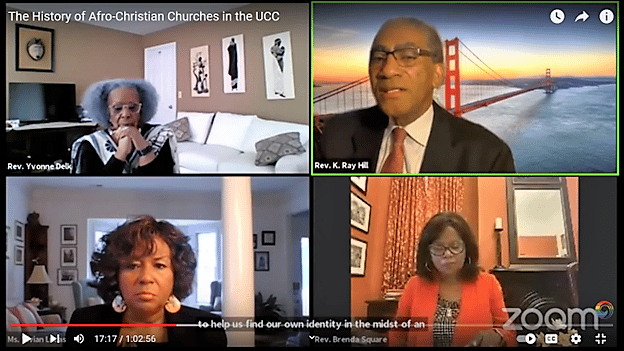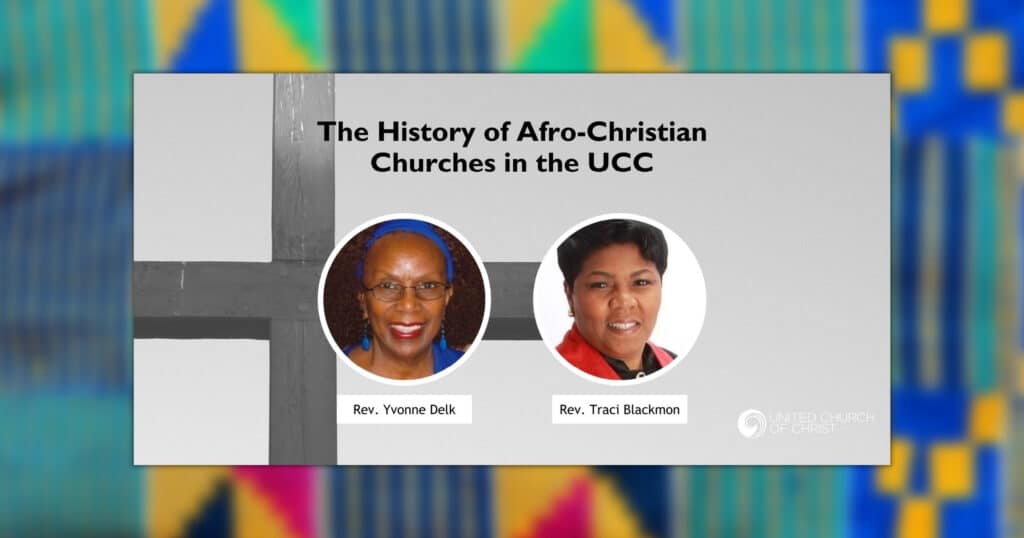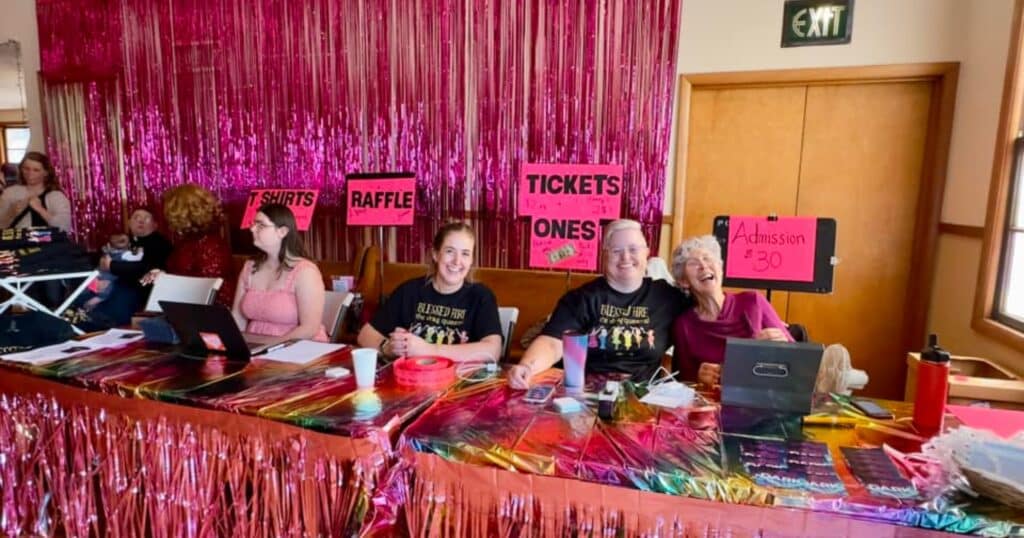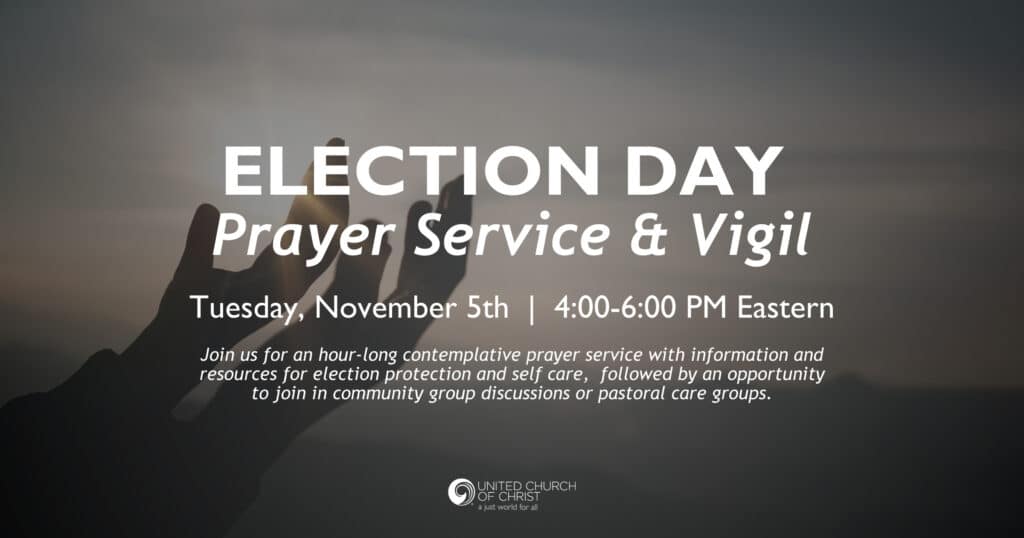Afro-Christian tradition’s status as distinct UCC ‘stream’ gets Historical Council support
For decades, new United Church of Christ members have typically learned about four streams of tradition that formed the denomination: Congregational, Christian, Evangelical and Reformed.
But there is a fifth stream — just as strong — that has not usually been named.
The UCC Historical Council has just voted to recognize that “fifth stream” — the Afro-Christian tradition — as separate from and equal to the other four.
At its annual meeting on Sept. 23, the 12-member council voted that it:
“…acknowledges and affirms the Afro-Christian Convention as the Fifth Stream of the UCC historical legacy. The Historical Council will celebrate the concept of the Fifth Stream and engage fully in the dissemination and promotion of the new text The Afro-Christian Convention: The Fifth Stream of the United Church of Christ through all possible means.”
The text mentioned in the council’s vote is a book in development by The Pilgrim Press. It is being edited by the Rev. Yvonne Delk, a prominent UCC elder and a daughter of that tradition. Full recognition for the Afro-Christian Convention — separate from the wider “Christian” stream — “is not about the past; it’s about the present and the future,” she said.
But it is also about exposing what Delk described as a “fault line.” The predominantly white UCC, since its formation in 1957, has tended to regard Afro-Christian churches as — in Delk’s words — an object of the UCC’s mission “rather than a subject that could inform its mission.”
‘Truth-telling and truth-facing’
The stream’s past and present were both covered in a 2021 webinar, featuring Delk and other speakers from the Afro-Christian tradition. In many ways, the one-hour presentation set the course toward the Historical Council’s recent vote. A recording of it is here, at the UCC YouTube channel.
The timing of the webinar was important. It took place just weeks before the UCC introduced its Join the Movement Toward Racial Justice campaign.
The Rev. Traci Blackmon, whose Justice and Local Church Ministries leads that current movement, helped to host the webinar. The UCC associate general minister said it was past time to bring Afro-Christian history to the forefront. She said the UCC “cannot engage in the racial justice work that we have announced that we are going to engage in without first telling our own truth.”
Delk agreed about that need. She said understanding the history — and the gifts that the living Afro-Christian tradition has to offer today — are both important “as the United Church of Christ takes time now to seriously examine its role in racism and white privilege and white power.”
“If our denomination is to truly be open to the movement of the Holy Spirit at this particular time in the history of our nation, it has to take the time for truth-telling and truth-facing,” she said.
‘Left the balconies’
That rich history, as Delk noted, includes the fact that the movement, by the turn of the 20th century, “included 150 churches, 25,000 members, 185 ordained ministers and licentiates, and 150 Sunday schools, located primarily … in North Carolina and Virginia.”
She said the Afro-Christian churches:
- Had emerged “out of a dehumanizing system of chattel slavery in 1867” and “left the balconies of the white churches.” That was because, “while James O’Kelley, one of the white founders of the Christian denomination, opposed the system of slavery, the white Southern Christian Convention did not. It did not embrace the Afro Christians as equals.”
- Had a “unique and distinct stream of consciousness” marked by its African identity; a relationship to the divine that integrated mind, body and spirit; strategic ways of equipping of its members “with meaning and value”; “intentional structures and ministries” for training and education; and a mission-mindedness that included work in Africa and the Caribbean. Today’s Franklinton Center at Bricks and more than 60 Afro-Christian congregations in the UCC’s Southern Conference continue that legacy.
- Formed the Afro-Christian Convention in 1892, and, with Black Congregationalists in 1950, the Convention of the South. That latter body of the Congregational Christian Churches included Black churches from Texas to Virginia.
Key decision
A key historical decision came in the run-up to the 1957 union of the Congregational Christian Churches and the Evangelical and Reformed Church.
Afro-Christians, as part of the Convention of the South, “had to face a serious question of whether our life being integrated into the United Church of Christ would be worth the gain,” Delk said.
The Convention “initially wanted to stay together as a Conference – as a Conference where we could name the reality of our faith without having to move through and to be connected to a predominantly white system that we would have to be held accountable to,” she said. “What does it mean to be ordained – be whose rules and regulations? What does it mean for us to engage in mission – in mission by whose rules and regulations?”
‘New lines were drawn’
But there was pressure to integrate. “This new United Church of Christ really wanted to embody all of us throughout its parts and not have a separate part that was named by race,” Delk said. The Convention had to decide what to do. “Sitting with the other mothers and fathers at the table, our mothers and fathers … decided to in fact become inclusive and to integrate into the various [geographical] Conferences. So new lines were drawn.
“And the body that had held strong, and the body that had been so effective in terms of ministry to the needs of African Americans in the Afro-Christian tradition, made a decision to in fact integrate into the United Church of Christ system.
“And the question continues: What have we gained by that, and what have we lost by that?”
The loss was already being felt at the formation of the UCC in 1957, Delk said. “It was a union envisioned by whites, produced by whites, to proclaim the good news of the gospel of unity of four distinct faith communities coming together with a vision of unity for all of humankind. A fault line existed from its very beginning. This was a predominantly Eurocentric unity model, absent in any significant way of the presence of its Afro-Christian stream.”

No longer hidden
As noted in the webinar, that history was documented in a 1984 book by a current Historical Council member, the Rev. Barbara Brown Zikmund. Volume 1 of her Hidden Histories in the United Church of Christ includes a chapter, “The Afro-Christian Connection,” by the Rev. Percel Alston. A minister and leader within the tradition, he also led the education division of the United Church Board for Homeland Ministries, a forerunner of today’s Justice and Local Church Ministries.
Delk expressed gratitude for that work — and said it’s time for more. “It’s not sufficient to see the Afro Christian story as a hidden history or as a footnote,” she said. “It has to be a headlight, empowering the United Church of Christ to live out its identity and its mission in new ways.”
To that end, Blackmon, at the end of the webinar, offered to fund a new book on the Afro-Christian heritage. Now aiming for publication in 2023, it will include contributions on Afro-Christian ministries — historical and current — by Delk and seven other authors:
- General Secretary Iva Carruthers of the Samuel DeWitt Proctor Conference, Chicago
- Pastor K. Ray Hill of Maple Temple UCC, Raleigh, N.C.
- Past Executive Director Vivian Lucas of Franklinton Center at Bricks, Whitakers, N.C.
- Senior Minister Henry Simmons of St. Albans Congregational UCC, Queens, N.Y.
- Professor Emerita Julia Speller of Chicago Theological Seminary
- Pastor Brenda Square of Beecher Memorial Congregational UCC, New Orleans, who chairs the Afro-Christian Legacy and Preservation Project at Franklinton Center
- Past Chair Richard Taylor of the UCC Historical Council
‘Independence, self-determination’
Speller, a scholar of American church history and a member of the Historical Council, told UCC News that the vote is about “far more than adding the stories of Afro-Christian churches in Virginia and North Carolina into the founding narrative of the UCC.”
“Following the Civil War, these churches gathered and worked in local Conferences that consolidated in 1892 to form the Afro-Christian Convention,” she said. “In spite of the many challenges of racism that it encountered, it operated in the form and function of other Protestant denominations. It met biennially, had a publishing house, divisions of Christian education, local and foreign missions, strong women’s auxiliaries, and more.”
With each merger — into the Congregational Christian Churches in 1931, the Convention of the South in 1950, and the UCC in 1957 — “it was acknowledged simply as ‘Afro-Christian churches,’ yet it brought a fierce spirit of independence and self-determination, sustained by its love of Christ, the church, and its African heritage, that is still alive today.”
She said the Historical Council vote “honors a God who continues to speak words of grace and hope, in the often unsettling giftedness of our diversity. It also offers an opportunity to ask new questions and discover new dimensions of our individual and collective identities as a prophetic Church, at all level of our ministry.”
‘Deeply significant’
Another Historical Council member, the Rev. Carrie Call, Conference minister of the Penn Central Conference, said the council will work to get the word out. She said educational sessions are being planned for the 2023 General Synod, and the authors of the new book “will have the chance to meet with members of the history and polity teachers’ network.”
“We will also likely create a set of talking points to share with Conference ministers so they can be shared within Conferences in various ways. This will be a concerted effort and will rely on the testimony of a few to educate the many. And we are committed.”
“The confirmation of the role of Afro-Christians in the development of the UCC is deeply significant to the teaching of UCC history and polity,” Call said. “Students and those seeking pastoral authorization will be exposed to the Afro-Christian Stream and will gain a more complete understanding of the history and formation of the UCC. They will hear the stories of faithful believers in the wake of the Civil War who built churches and established centers for education.
“Personally, I’m very excited. The Council has worked to lift the Afro-Christian aspects of our history for years and so this moment is a very significant step.”
‘Legacy continues’
“The story of the Afro-Christian Convention is not simply a story about the past; it is about the journey of a people walking by faith and with faith in uncertain and anxious times,” Delk told UCC News. “It is a story that lives between generations.
“What was invisible as a fifth stream in the 1957 inaugural march in Cleveland, forming the United Church of Christ, is fully visible today. It lives in the Afro-Christian churches of the Southern Conference. It lives in the contributions of Afro-Christian leadership who serve in the national, Conference and local settings of our church. It lives in Franklinton Center at Bricks through the witness of all the persons and organizations who have come to this sacred ground for empowerment, renewal, and resourcing for the work of justice and freedom.”
And in the webinar, she further emphasized the tradition’s relevance for today. “As we stop to examine who we are, we can learn much from this stream about faith, about spirit, about community, about justice, about freedom and liberation,” she said. “And as we pause at this moment of our history in the United Church of Christ and at this intersection of our life and mission, it’s important that we do not recreate a fault line of 1957.
“This fifth stream must be visible – an important component of our commitment to a unity model that’s not simply Eurocentric. The Afro-Christian legacy continues.”
Content on ucc.org is copyrighted by the National Setting of the United Church of Christ and may be only shared according to the guidelines outlined here.
Related News
‘Blessed Are the Drag Queens’: Oregon church event celebrates love and acceptance
Amid harmful anti-trans and nonbinary legislation and political messaging, Bridgeport United...
Read MoreUCC to offer Election Day Prayer Service and Vigil
On Election Day, Nov. 5, join the Rev. Karen Georgia A. Thompson together with United Church...
Read MoreGoing beyond the blessing: Churches emulate St. Francis’ care for animals
https://www.youtube.com/watch?v=lu3LYwhLxCo UCC News presents a video news story on the...
Read More


